

Strained Family Relationships; When To Cut The Ties. What Is Family?

In just a few words... family defines us. It's a significant part of who we are to the core. An interesting thing about families is that people can tolerate more bad than good, and even a strained relationship can still be considered satisfying for both people. Families can be the ones who drive you nuts, but are also there by your side in tough spots. That's a fair trade: Take the good with the bad.
These are ideal conditions though, and for some it's never been this way with certain family members. Evaluating the Relationship. Roles in the Addicted Family. When a parent is addicted to alcohol, drugs, or processes, over time the entire family is organized around the addict and the emotional chaos he or she generates.
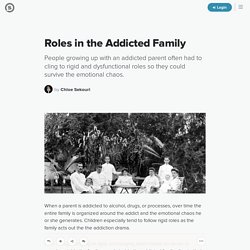
Children especially tend to follow rigid roles as the family acts out the the addiction drama. Even though clinging to rigid, unchanging roles makes no sense to people outside the family, people inside the addicted family cling to their roles as though their very survival depends on it. The family as a unit uses roles to create the illusion of stability and normalcy. This illusion helps the family members carry on in the face of the addict's unpredictable and harmful behaviors, but they pay a terrible price. Family members stuck in rigid roles gain pseudo-stability but must sacrifice individuality, self-esteem, self-respect, serenity, and many other things to get it.. Children are particularly affected by the rigid roles of the addicted family. Making Peace in Dysfunctional Families: How to Fix It and Whether You Should « The Spiritual Eclectic. Genuinely enjoying one another’s company. A family outing to Grayton Beach, with Lorna, Aislinn, Shannon, and Brian.
Dysfunctional families. DramaTriangle. Characteristics of Dysfunctional Families. Below is a list of common symptoms and behavior patterns in dysfunctional families, and their affect on Adult Children of Dysfunctional Families.
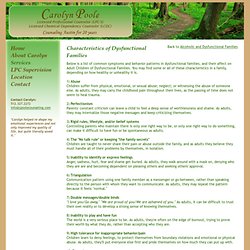
You may find some or all of these characteristics in a family, depending on how healthy or unhealthy it is. 1) Abuse Children suffer from physical, emotional, or sexual abuse; neglect; or witnessing the abuse of someone else. As adults, they may carry the childhood pain throughout their lives, as the passing of time does not seem to heal trauma. 2) Perfectionism Parents' constant criticism can leave a child to feel a deep sense of worthlessness and shame. As adults, they may internalize those negative messages and keep criticizing themselves. 3) Rigid rules, lifestyle, and/or belief systems Controlling parents who maintain there is only one right way to be, or only one right way to do something, can make it difficult to have fun or be spontaneous as adults. 7) Double messages/double binds "I love you/Go away.
" ACON Page - LIGHT'S HOUSE. Isconnected from their authentic selves.
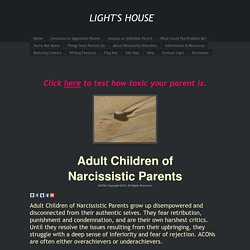
They fear retribution, punishment and condemnation, and are their own harshest critics. Until they resolve the issues resulting from their upbringing, they struggle with a deep sense of inferiority and fear of rejection. ACONs are often either overachievers or underachievers. Adult Children of Narcissists are well-practiced in the art of pretending they have no needs, believe that they must present as demand-less in order to gain others' acceptance, and that if they show their true wants and needs to others, they will be rejected. TOXIC-PARENTS. The fragmented family: Parental Alienation. Details Published: 13 August 2011 Hits: 8639 Parental Alienation occurs when one parent turns a child against the other parent, and it can devastate relationships, writes Lynda Renham-Cook. 14 August 2011 Parental Alienation hit the headlines in a big way a few years ago thanks to the actor Alec Baldwin.
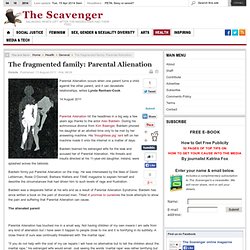
Baldwin blamed his estranged wife for the leak and accused her of Parental Alienation. Baldwin firmly put Parental Alienation on the map. Rebel Heart - Charlotte's Blog - My Dad is an Unregistered, Unprosecuted Sex Offender. Warning: the following post could be a trigger post if you have been a victim of sexual abuse.
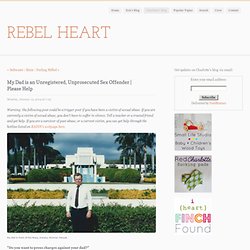
If you are currently a victim of sexual abuse, you don't have to suffer in silence. Tell a teacher or a trusted friend and get help. If you are a survivor of past abuse, or a current victim, you can get help through the hotline listed on RAINN's webpage here. My dad in front of the Mesa, Arizona, Mormon Temple. "Do you want to press charges against your dad? " "No! " Because what else would a 14 year old say?
Dysfunctional%20Families. Dysfunctional family. Assessment | Biopsychology | Comparative | Cognitive | Developmental | Language | Individual differences | Personality | Philosophy | Social |Methods | Statistics | Clinical | Educational | Industrial | Professional items | World psychology | Clinical:Approaches · Group therapy · Techniques · Types of problem · Areas of specialism · Taxonomies · Therapeutic issues · Modes of delivery · Model translation project · Personal experiences · This article is in need of attention from a psychologist/academic expert on the subject.Please help recruit one, or improve this page yourself if you are qualified.This banner appears on articles that are weak and whose contents should be approached with academic caution.
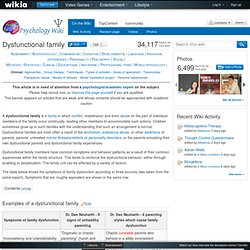
Aspects of Dysfunctional Families. Dysfunctional Families: Recognizing and Overcoming Their Effects "As a kid I was like a miniature adult.
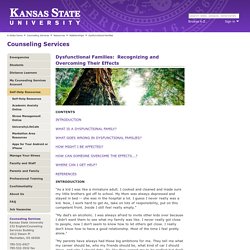
I cooked and cleaned and made sure my little brothers got off to school. My Mom was always depressed and stayed in bed -- she was in the hospital a lot. Dysfunctional family (wikipedia) Perceptions[edit] A common misperception of dysfunctional families is the mistaken belief that the parents are on the verge of separation and divorce.
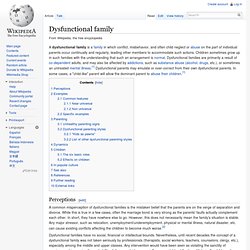
While this is true in a few cases, often the marriage bond is very strong as the parents' faults actually complement each other. In short, they have nowhere else to go. However, this does not necessarily mean the family's situation is stable. Any major stressor, such as relocation, unemployment/underemployment, physical or mental illness, natural disaster, etc. can cause existing conflicts affecting the children to become much worse.[2]
Roles. Characteristics.